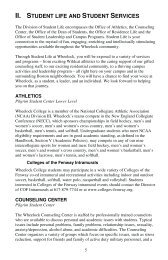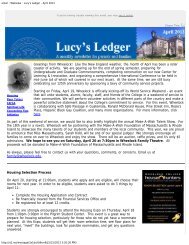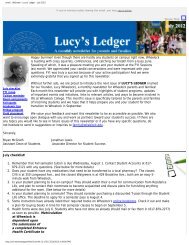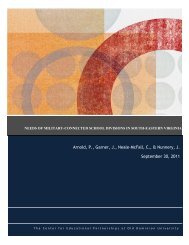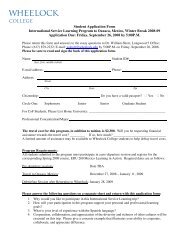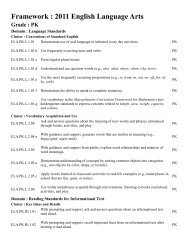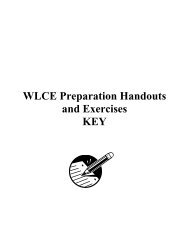Henry IV Part 1: Theme of Honor
Henry IV Part 1: Theme of Honor
Henry IV Part 1: Theme of Honor
You also want an ePaper? Increase the reach of your titles
YUMPU automatically turns print PDFs into web optimized ePapers that Google loves.
1<br />
<strong>Henry</strong> <strong>IV</strong> <strong>Part</strong> 1: <strong>Theme</strong> <strong>of</strong> <strong>Honor</strong> <br />
Melissa Whiteside <br />
In Shakespeare’s play <strong>Henry</strong> <strong>IV</strong> <strong>Part</strong> 1, the concept <strong>of</strong> honor plays a key role in <br />
the actions <strong>of</strong> different individuals throughout the play. However, honor is perceived <br />
differently by each character, which in turn leads them to very different courses <strong>of</strong> <br />
action. Three particular individuals who take honor into account differently throughout <br />
the play are Prince Hal, Hotspur, and Falstaff. For Hotspur, honor relates to feelings <strong>of</strong> <br />
duty on the battlefield and reputation, while Hal thinks <strong>of</strong> honor as something that <br />
relates to virtuous behavior: he works on redeeming his own image by striving to <br />
achieve honor through his behavior. Unlike both Hotspur and Hal, Falstaff has a very <br />
different idea <strong>of</strong> the meaning and importance <strong>of</strong> honor. While Hotspur and Hal both <br />
recognize honor as something that is important and admirable, Falstaff views honor as <br />
only a word that stays with people who have died and does not stay with the living; <br />
therefore Falstaff wants nothing to do with the word honor. Throughout the play, honor <br />
is thought <strong>of</strong> in many different ways and some characters view honor as important while <br />
others do not see an importance in the meaning <strong>of</strong> honor. The idea <strong>of</strong> honor changes <br />
between each individual and in this way the theme <strong>of</strong> honor does not have one specific <br />
meaning, but instead has meanings specific to each character’s interpretation <strong>of</strong> the <br />
word honor. <br />
According to King <strong>Henry</strong>, Hotspur is “the theme <strong>of</strong> <strong>Honor</strong>’s tongue,” (1. 1. 80) <br />
which means the king thinks <strong>of</strong> Hotspur as the perfect example <strong>of</strong> a man <strong>of</strong> honor. The <br />
king describes how Sir Walter Blunt informed him <strong>of</strong> Hotspur’s battle with Archibald and <br />
how Hotspur ended up taking prisoners, which was considered “an honorable spoil/a <br />
gallant prize” (1.1. 74-‐75). Therefore, the king views Hotspur as honorable because he is <br />
1
2<br />
successful in battle, is fearless, and spends his time with royalty, unlike the king’s own <br />
son who spends his time in a tavern. King <strong>Henry</strong> also believes that Northumberland, <br />
Hotspur’s father, is blessed to have such a son. Hotspur himself thinks that taking action <br />
against the king, who he believes cast aside those who helped him to the throne, is a <br />
way to redeem honor. Hotspur discusses a plan to overthrow the king with <br />
Northumberland and Worcester and this plan involves fighting and defeating the king’s <br />
army on the battlefield, and in this way honor and battles relate to each other. Hotspur <br />
explains how they have been discarded and shamed by the king they helped, and he <br />
goes on to say “yet, time serves wherein you may redeem/ Your banished honors and <br />
restore yourselves/Into the good thoughts <strong>of</strong> the world again, / Revenge and jeering and <br />
disdained contempt/Of this proud king, who studies day and night/ To answer all the <br />
debt he owes you” (1. 3. 184-‐189). According to Hotspur, the honor that was lost <br />
through the king’s ill treatment <strong>of</strong> him, Northumberland, and Worcester can be <br />
redeemed after the king is defeated and dethroned. Also, it is clear that Hotspur is <br />
determined to go to great lengths to redeem his honor when he explains how he will <br />
“pluck bright honor from the pale-‐faced moon, / Or dive into the bottom <strong>of</strong> the deep, / <br />
Where fathom line could never touch the ground, / And pluck up the drowned honor by <br />
the locks” (1. 3. 207-‐210). <br />
Through Hotspur’s conversation with Owen Glendower and the way Hotspur <br />
ridicules him, it is apparent that Hotspur does not think highly <strong>of</strong> the way Glendower <br />
exaggerates how important and powerful he is. For example, when Glendower says “I <br />
can call spirits from the vasty deep” Hotspur replies, “Why, so can I, or so can any man, / <br />
But will they come when you do call for them?” to which Glendower responds, “Why, I <br />
can teach you, cousin, to command the devil.” And it becomes clear that Hotspur grows <br />
impatient <strong>of</strong> Glendower’s embellishments and thinks it’s more honorable to tell the <br />
2
3<br />
truth when he says “And I can teach thee, coz, to shame the devil/ By telling truth. Tell <br />
truth and shame the devil” (3. 1. 55-‐61). When Hotspur learns that his father is not <br />
going to join them in battle, and Glendower and his forces have been delayed, he does <br />
not give up hope <strong>of</strong> still being able to defeat King <strong>Henry</strong> and Prince Hal’s forces. Instead, <br />
Hotspur thinks about the positive aspects <strong>of</strong> Northumberland and Glendower not <br />
helping in the battle: he explains how the absence <strong>of</strong> his father “lends a luster and more <br />
great opinion, / A larger dare, to our great enterprise” (4. 1. 81-‐82). Hotspur views the <br />
absence <strong>of</strong> his allies as more <strong>of</strong> a challenge; if he is able to defeat the king’s army he will <br />
be rewarded with even greater honor. Also, even dying in battle is seen as a way for <br />
Hotspur to gain honor by being brave and heading into a battle in which they have a <br />
very great disadvantage. For example, when Hotspur learns that Glendower will not join <br />
them, and the king has thirty thousand soldiers, he realizes his army does not have <br />
much chance but does not back down from the fight and says “Forty let it be, / My <br />
father and Glendower being both away, / The powers <strong>of</strong> us may serve so great a day. / <br />
Come let us take a muster speedily./ Doomsday is near. Die all, die merrily” (4. 2. 138-‐<br />
142). Hotspur’s idea <strong>of</strong> honor is about redeeming his reputation through revenge on the <br />
battlefield by dethroning the king who he believes cast him aside after he helped him to <br />
the throne in the first place. In this way, Hotspur seems to base honor on respect and he <br />
believes it can be won through battling and defeating one who has taken that respect <br />
away. <br />
While the king thinks <strong>of</strong> Hotspur as the ideal image <strong>of</strong> honor, the king’s own son, <br />
Hal, is viewed very differently because <strong>of</strong> where and with whom he spends his time. <br />
King <strong>Henry</strong> describes how he would rather have an honorable man as a son, like <br />
Hotspur, instead <strong>of</strong> someone who he believes is dishonorable. King <strong>Henry</strong> makes this <br />
idea clear when he says, “Whilst I, by looking on the praise <strong>of</strong> him, / See riot and <br />
3
4<br />
dishonor stain the brow/ Of my young Harry. O that it could be proved/ That some <br />
night-‐tripping fairy had exchanged/ In cradle-‐clothes our children where they lay, / And <br />
called mine ‘Percy’ and his ‘Plantagenet’! / Then would I have his Harry, and he mine” <br />
(1. 2. 83-‐89). Prince Hal’s own father does not view Hal as honorable and wishes that it <br />
could be proved that he was really Hotspur’s father because Hotspur and Hal were <br />
switched at birth. The prince spends most <strong>of</strong> his time at a tavern where he plays jokes <br />
and steals, which is not something a person <strong>of</strong> honor would do. It is clear that the prince <br />
knows that what he is doing is wrong because he admits that he has had “loose <br />
behavior”; however, he wants to redeem himself so he can become honorable. Prince <br />
Hal explains how he wants to change and gain honor by repaying those he has <br />
dishonored when he says, “So when this loose behavior I throw <strong>of</strong>f/ And pay the debt I <br />
never promised, / By how much better than my word I am, / By so much shall I falsify <br />
men’s hopes; / And, like bright metal on a sullen ground, / My reformation, glitt’ring <br />
o’er my fault, / Shall show more goodly and attract more eyes/…Redeeming time when <br />
men think least I will” (1. 2. 215-‐224). Hal is planning to surprise everybody who looked <br />
down at his actions by redeeming himself, which is something that is not expected. <br />
After deciding to redeem himself, Hal talks to his father, King <strong>Henry</strong>, about his <br />
plan to defeat Hotspur in battle and gain honor. Hotspur says, “I will redeem all this on <br />
Percy’s head, / And, in the closing <strong>of</strong> some glorious day, / Be bold to tell you that I am <br />
your son, / When I will wear a garment all <strong>of</strong> blood/ And stain my favors in a bloody <br />
mask, / Which, washed away, shall scour my shame with it” (3. 2. 137-‐142). Also, when <br />
Hal says, “This gallant Hotspur, this all praised knight, / And your unthought-‐<strong>of</strong> Harry <br />
chance to meet. / For every honor sitting on his helm, / Would they were multitudes, <br />
and on my head/ My shames redoubled! For the time will come/ That I shall make this <br />
northern youth exchange/ His glorious deeds for my indignities” (3. 2. 145-‐151) it is <br />
4
5<br />
clear that Hal thinks he can rid himself <strong>of</strong> his shame by gaining honor after defeating <br />
Hotspur although he doesn’t simply want to gain honor: he wants to trade his shame for <br />
Hotspur’s honor. Hal wants to redeem himself in his father’s eyes and wants his father <br />
to be proud <strong>of</strong> him; he wants to become an honorable person, but Hal’s plan to gain <br />
honor is by taking honor from Hotspur, whom Hal believes has done “glorious deeds.” <br />
Hal wants to gain honor by taking it from someone instead <strong>of</strong> trying to do great deeds <br />
himself to gain his own honor, which does not make Hal’s plan sound very honorable. <br />
However, on the battlefield Hal proves himself to be very brave and a strong fighter, and <br />
when he saves his father from being killed by Douglas the king tells him, “Thou hast <br />
redeemed thy lost opinion/ And showed thou mak’st some tender <strong>of</strong> my life/ In this fair <br />
rescue thou hast brought to me” (5. 4. 48-‐50). Therefore, by protecting his father in <br />
battle Hal was able to show his father that he was a noble person, and Hal was also able <br />
to defeat Hotspur which means that Hal’s plan was successful and he was able to <br />
redeem himself from a dishonorable man to an honorable one. <br />
Hotspur and Hal both view honor as something to be strived for; however, <br />
Falstaff has a very different idea <strong>of</strong> the word honor which leads him to steer away from <br />
the word. Falstaff is a person who robs, does not pay what he owes at the inn, and <br />
misuses his commission as an <strong>of</strong>ficer, and in these ways Falstaff is not a character who is <br />
considered to be honorable. Before the battle begins between the king and the rebels, <br />
Falstaff decides to make money by taking payment from men who do not want to <br />
become soldiers and do not want to fight in the battle. Instead <strong>of</strong> taking real soldiers to <br />
battle, Falstaff takes men who are beggars and prisoners and uses them as his army, <br />
which is a very dishonorable action, especially since throughout the play honor is <br />
viewed as something to be won in battle. Falstaff is not someone who looks forward to <br />
fighting in a battle with the chance <strong>of</strong> becoming killed. It is also clear that he does not <br />
5
6<br />
care about what happens to these men he is bringing with him into battle when he says, <br />
“Tut, tut, good enough to toss; food for powder, / food for powder. They’ll fit a pit as <br />
well as/ better. Tush, man, mortal men, mortal men” (4. 2. 66-‐68). Falstaff casts the lives <br />
<strong>of</strong> these beggars and prisoners aside and he has no sympathy to the fact that many <strong>of</strong> <br />
them will be killed while fighting in the battle; instead he simply describes them as being <br />
food for the guns. Falstaff does not think <strong>of</strong> fighting in battle as something that is very <br />
honorable; he instead sees it as a way <strong>of</strong> death. Later, Falstaff goes on to explain his <br />
own idea <strong>of</strong> honor even more by describing how honor cannot “take away the grief <strong>of</strong> a <br />
wound” (5. 1. 133) and also is not something that can stay with the living. According to <br />
Falstaff, honor is “a word…air. A trim reckoning” (5.1. 135-‐136), which means that <br />
Falstaff views honor as a simple word with no important, concrete meaning. He also <br />
describes how honor is something that men who have died have and they do not feel it <br />
or hear it, which means that Falstaff views honor as something that is useless to these <br />
men. Falstaff does not want anything to do with honor because he believes it is only <br />
gained in death, has no solid meaning, and has no use for anyone. Falstaff describes <br />
honor as a word that cannot take away the pain <strong>of</strong> a physical injury and also something <br />
that can be thought <strong>of</strong> differently by various people. Falstaff shows that he has no <br />
concept <strong>of</strong> honor when he claims to have killed Hotspur himself on the battlefield, even <br />
though he had just seen Hal kill Hotspur. While honor is not important to Falstaff, it is <br />
important to others who assign it a specific meaning. <br />
Hotspur, Hal, and Falstaff are three very different characters in Shakespeare’s <br />
play <strong>Henry</strong> <strong>IV</strong> <strong>Part</strong> 1, and while each <strong>of</strong> these characters perceives the idea <strong>of</strong> honor and <br />
what is honorable in different ways, there are also some similarities in the ways they <br />
think <strong>of</strong> honor. Both Hotspur and Hal are looking to gain honor by defeating another in <br />
battle. However, Hal wants to take Hotspur’s honor for himself by defeating him in <br />
6
7<br />
battle so he can redeem himself with his father, while Hotspur wants to gain his own <br />
honor back by defeating the king whom he believes has taken his honor from him by <br />
casting him aside. Hotspur and Hal both think <strong>of</strong> honor as a type <strong>of</strong> bravery that can be <br />
won by a victory in a battle. Unlike Hotspur and Hal’s idea <strong>of</strong> honor, for Falstaff, honor is <br />
not something that is worth putting one’s life on the line for. The word honor does not <br />
hold meaning to Falstaff like it does to Hal and Hotspur, and Falstaff describes honor as <br />
merely a word that has no specific meaning and no use to him. While throughout the <br />
play the idea <strong>of</strong> honor seems to be most commonly based on redeeming oneself <br />
through battle, not everyone shares this same idea <strong>of</strong> the word, and in this way the <br />
word honor is specific to different individuals and how they perceive the meaning <strong>of</strong> the <br />
word. <br />
7



